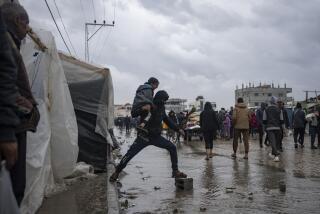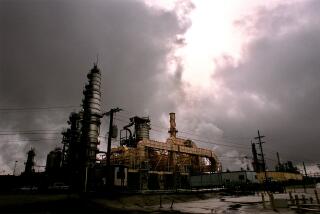Lawmakers Clash Over U.N. Probe
- Share via
WASHINGTON — Congressional Democrats and Republicans clashed Wednesday over how to investigate billions of dollars worth of reported improprieties in the international program that for five years allowed Iraq to sell limited amounts of oil to buy food and medicine.
Rep. Dan Burton (R-Ind.) said at the hearing of the House International Relations Committee that it may be time to use the “power of the purse” to pressure the United Nations to provide greater public disclosure of the workings of its officials.
But Rep. Tom Lantos (D-San Mateo) cautioned against attacking the U.N., which the U.S. hopes will help with the hand-over of sovereignty in Iraq. He blamed members of the U.N. Security Council, including the U.S., for failing to oversee the “oil-for-food” program.
In a report released this week, the congressional General Accounting Office said that billions of dollars in revenue produced from 1997 to 2002 had been siphoned off by Saddam Hussein for kickbacks and bribes.
The U.N. has launched its own investigation, headed by former Federal Reserve Chairman Paul Volcker.
Burton said the U.N. had not been cooperative with investigators. But U.N. Secretary- General Kofi Annan told reporters at the U.N. that he had worked to make files available and objected to the harshness of accusations.
John Ruggie, a Harvard professor and former U.N. advisor, testified that the Security Council members were responsible for the program through an oversight committee they established.
“The Security Council approved roughly 36,000 contracts over the lifespan of the program,” Ruggie said. “Every member had the right to hold up contracts if they detected irregularities, and the U.S. and Britain were by far the most vigilant among them. Yet, as best as I can determine, of those 36,000 contracts not one -- not a single solitary one -- was ever held up by any member on the grounds of pricing.”
According to the GAO, of the $10.1 billion that Hussein diverted, $4.4 billion was from overcharging on oil exports and illicit charges on imports of food and other material. Hussein obtained an additional $5.7 billion through oil smuggling by Iraqi officials. Annan said the U.N. had no control over the smuggling.
“Why is all this being dumped on the U.N.?” Annan asked. “These allegations are doing damage, and we intend to face them sternly and do whatever we can to correct them.”
However, Burton, complaining of the U.N.’s lack of cooperation with investigators, threatened to seek to withhold U.S. funds to the United Nations. U.S. funds are 22% of the regular U.N. budget of more than $2.5 billion.
Claudia Rosett, a senior fellow at the Foundation for the Defense of Democracies, a conservative Washington think tank, testified that a “secret” U.N. list showed that 75 of the firms authorized to purchase oil from Saddam Hussein were registered to the oil-rich United Arab Emirates, suggesting a possible abuse of the program that intended that the oil go to countries in need, she said.
Times staff writer Maggie Farley at the United Nations contributed to this report.
More to Read
Sign up for Essential California
The most important California stories and recommendations in your inbox every morning.
You may occasionally receive promotional content from the Los Angeles Times.













